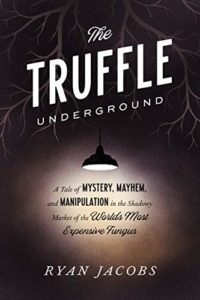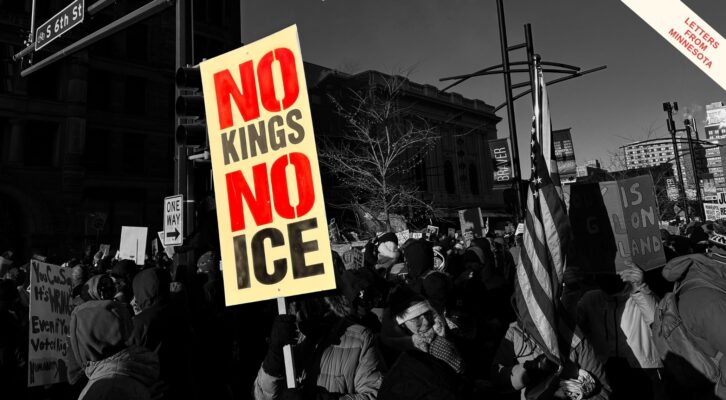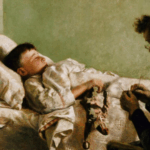The grainy black-and-white image from the infrared camera flashed onto the truffle farmer’s mobile phone sometime before six in the evening. Perched about seven feet up the trunk of a tree, the camera was positioned high enough above the thieves’ sight lines that the red blink of light didn’t attract notice. The farmer quickly dialed André Faugier, one of the gendarmerie’s chief commanders, at a special phone line dedicated to the truffle-surveillance detail he ran. “Okay, come here,” the farmer said. “The camera just worked. There is a robber.”
It was New Year’s Eve 2013, and Faugier was behind the wheel of his patrol car, driving along a country road, not far from the village of Montségur-sur Lauzon in the Vaucluse department’s northern neighbor, Drôme. He sped toward the scene of the unfolding crime. A few minutes later, Faugier’s phone rang again: The thief had already driven off the farmer’s property. The car, an old, beatup white sedan, appeared to be heading in the direction of Richerenches.
Faugier texted the information to his entire list of truffle farmers, who exchanged information with him constantly. They peeked through their windows and doors into their fields to check if the thief had yet landed at their properties.
A few truffle farmers who happened to be near the traffic circle outside Richerenches reported the car’s direction back to the gendarmerie. By this point, officers from the nearby villages of Saint Paul-Trois-Châteaux to the west, and Valréas to the east, had been scrambled for the pursuit.
Eventually, the gendarmerie cars caught up, and the thief accelerated far beyond the speed limit of the country road. Heaving into a sharp curve, the car skidded off the pavement and lurched to a halt in a truffle orchard.
The officers pulled over, exited their vehicles, and marched out into the field to inspect the wreck. Instead of one thief, they found two. And instead of hardened convicts, they found boys. One was nineteen; the other was just seventeen. They discovered eight hundred grams of fresh black winter truffles in the car, an €800 stop in what was likely to have been a most eventful evening for the teenagers.
By this point, the young men had crossed from Faugier’s jurisdiction in the Drôme department into Vaucluse, so one of the officers from that department handcuffed the suspects and drove them to jail. Vaucluse’s laws were far more lenient on truffle theft than Drôme’s, so the thieves were released not long after the arrest with nothing more than a petty fine.
Faugier was not surprised. He had come to expect nabbing young suspects and seeing meager punishments. In much the same fashion as America, French law demands leniency for minors. Faugier suspected that gang leaders deliberately recruited young, impressionable minions to insulate the organization from potential consequences. Though there were some instances of rival farmers sneaking onto each other’s properties at night, the majority of the people Faugier and his colleagues had arrested with stolen truffles were members of a larger gang of thieves who associated on the basis of their shared Roma ethnic ancestry and lived an itinerant lifestyle in the countryside. The Roma people trace their roots back to northern India, but their members live in various places throughout Europe, where they are frequently marginalized and scapegoated as the drivers of high urban crime rates.
Some farmers reported having spotted suspects under the age of fifteen, even primary-school-age children. The on-the-ground crews were constantly shifting. The few adults Faugier did manage to apprehend were likely selected because they had no formal criminal records and were therefore also subject to legal leniency. Without ever catching the criminal minds that plotted and ordered the heists, he had difficulty stanching them.
***
Faugier has all the attributes of a handsome man: dark hair, olive skin, brown eyes, cleanly shaven, medium build. But despite the added flair of heading up a secretive surveillance operation, something about him is decidedly unsexy. He reads more bookish than daring, looks more like a librarian than a detective. But it was his personality that had cultivated trust among the truffle farmers: He is soft-spoken, calm, gentle, and passionate about investigating crimes other gendarmerie officers would yawn at. He avoids the frenetic impulse of the French language and pauses every so often to chuckle at himself, mostly in deprecation. His expressive bushy eyebrows give him a whimsical lightness. He specializes in the investigation of truffle theft, which means he also specializes in soothing nerves.
The region Faugier oversees is home to approximately twenty-five hundred truffle growers, who together produce a substantial portion of the country’s national supply. And those are only official numbers; many of the farmers do not formally declare their production and revenues to the French government. To report theft, a farmer must first prove to Faugier that he officially owns the goods. When we met, Faugier wore a light blue polo shirt and an unzipped blue gendarmerie jacket with a horizontal white stripe over the breast. Soon after I arrived, he walked into the kitchen to fix me an espresso, a spoon clanked in the distance, and he came back with a small red cup. He wasn’t nearly as intimidating as I supposed he would be after the battle with the gendarmerie to get a meeting with him. The day before, a local truffle farmer named Joel Barthélémy had told me that Faugier never discussed his top secret operations, not even with his closest friends. But suddenly here he was, ready to talk. I was delighted to listen.
The majority of the people Faugier and his colleagues had arrested with stolen truffles were members of a larger gang of thieves who associated on the basis of their shared Roma ethnic ancestry and lived an itinerant lifestyle in the countryside.His office lies on a quiet, narrow street on the edge of the small fifteen-hundred-person village of Grignan, which is surrounded by lavender fields, vineyards, and truffle plantations. The modern beige building with a slanted tiled roof and a French tricolor “Gendarmerie” sign stands in stark contrast to the eleventh-century stone, Roman tile, and pastel shutters nearby. The room he works in is the size of a rich man’s closet, and when I visited, it was crowded with chairs and a desk for another officer. There were yellow walls and darker yellow window frames. A map of the region, with the Drôme department outlined in pink highlighter, was posted near his desk. A Cibox 4 GB thumb drive was plugged into his computer; the key chain label read, “Truffes.”
The ever-humble Faugier couldn’t remember when he became chief commander in Grignan; he took his glasses off and pursed his lips. We settled on a few years ago.
***
Faugier grew up about twenty minutes away from his office, in a commune close to where he and his colleagues chased the teenage thieves, Saint-Paul-Trois-Châteaux. Before he arrived in Grignan, he served in his hometown and in another small Drôme village named Suze-la-Rousse, but his work always seemed to take him out of the agency’s provincial boundaries. He began working as a gendarmerie officer around 2001, and not too long after he started, the farmers, individually, began visiting him to tell him there was a major problem with theft. One farmer’s fields were dug one night, and then the next week another farmer’s long-awaited fungi had been stolen as well.
Back then, the gendarmerie in Drôme was not keeping a close eye on truffle thefts, so the men decided to organize among themselves as a band of crop-guarding vigilantes. They went out into their fields with sticks and waited for the thieves to trespass. Concerned about potential violence and spurred by the farmers’ tips, Faugier finally told them he would lobby for an official surveillance program. He filed a formal request with France’s Ministry of the Interior, and eventually it was granted. His superiors even gave him a small budget for some basic surveillance equipment. The farmers were ecstatic. They told him they were prepared to help Faugier in whatever way they could to combat the thieves. He was born in the same rural landscape they were, and they trusted him.
He accompanied the farmers into their fields and had them show him which groves had been hit. During the summer, he sent his men on foot and bike patrols through the orchards to identify the most productive sections in the most secluded areas, the ones that were sure to catch the eyes of thieves. The patches were marked by bright leaves produced from well-irrigated soils, careful pruning, and the right type of rocky soil. The thieves, they suspected, were walking the same paths, casing the groves to see which trees would be worth returning to when winter fell. Had the thieves had the property or the means to buy truffle saplings, they were so observant that they would have made excellent truffle cultivators. They always seemed to know where the best truffle trees stood.
Faugier had become a member of the union of truffle farmers and requested that they consider purchasing an infrared camera so he could see what time and which days the thieves preferred for their pilferage. They complied. Each year, he helped place it in a tree of a grove he was certain would be targeted based on previous years’ reports and told the farmer to bury a collection of fresh truffles in a few places around it so the thieves’ dogs would linger long enough that he could ensure a clear shot of their faces.
Before each truffle season began, Faugier held meetings with the farmers to lecture them about how they could contribute to the investigations, to collect intelligence, and to instruct them about what their rights were when they encountered a trespasser. He toured southeastern France and even held a meeting on the other side of the country, in Périgord, an area now poor in truffle production but rich in reputation. (Long ago, the southwestern side of the country had many more truffles, and when companies first attempted to build an international market in the late-nineteenth century, they called all the truffles Périgord—no matter where they came from—because they hoped to ride the coattails of its international reputation for canned foie gras. The name never faded.) He advised them to put up “Private Property” signs so the thieves could have no excuses about wandering off in the wrong direction.
When the season formally began, the gendarmes organized night patrols near the spots with the highest likelihood of heists. Still the thieves came. “They always have one step in advance,” Faugier said. The farmers, as well as Faugier and his officers, feared the dark chases through the cold woods as much as they relished them. Amid the crisscrossing of flashlights and the chaos of the pursuits, the men easily lost track of the thieves in the nooks of the forest. They openly wondered how many suspects they were looking for and whether they were armed. The robbers learned to look around for red lights from the infrared cameras, and they came prepared with night-vision goggles that were nicer than the models Faugier and his men had access to.
Faugier suspected they purchased the goggles on the cheap at the border of France and Spain, where products are sold without the in-country 20 percent tax. Meanwhile, Faugier’s office remained strapped. The camera they used was bulky and five years behind the current technology. They patrolled mainly on foot, bicycles, and in smaller patrol cars. They were able to use a helicopter and motorbikes for a few months but then had to return them. They couldn’t possibly be everywhere at once.
During the course of the patrols, thieves threw their digging tools at approaching farmers. They hurled stones. When farmers fired warning shots into the sky, the thieves returned fire, so they could escape while farmers weighed the risks of pursuit. Sometimes, the thieves fired preemptively. Farmers, especially those who patrolled alone, walked the edges of their oak groves, increasingly petrified about what lurked in the darkness. They feared that their livelihood and years of work would be erased in a night under the moonlight, that a bullet shot in warning might end up lodged in their chest.
Faugier and his men considered the thieves armed and dangerous. Faugier took great precautions to ensure security; at a minimum, he required three officers per suspect. On a more recent pursuit involving four suspects near the village of Saint-Restitut, thirty-two officers participated, seventeen of them working out in the field.
Early on, Faugier ruled out sending his truffle surveillance team undercover. The robbers knew each other too well; they’d smell a gendarme from the other end of the oak grove. Occasionally, the thieves claimed they were farmers, but, as Faugier suggested, his men aren’t idiots either.
Not wanting to pursue a formal covert op and knowing he wouldn’t receive contact or full transparency from every farmer, Faugier found a digital avenue for his investigation as well. He created a handle on a French truffle-farming web forum—where producers troubleshoot growing techniques and exchange information about yields and recent trespasses—and began lurking. Using information gleaned there, as well as intelligence from farmers, he began plotting trends. He and his colleagues posted patrols in areas that were repeatedly hit, and soon, in and around the villages of Saint-Paul and Suze-la-Rousse, where Faugier focused most of his energies, the thefts began to drop.
***
But Faugier also had a secret, someone who allowed him to see things his foot patrols and his single infrared camera and even his truffle forum handle couldn’t. His name was Ernest Pardo, a giant man with hulking logs for arms, a barrel of a chest, short-cropped gray hair, and soft, tired brown eyes. At six feet seven and 240 pounds, he looked not unlike a retired NFL linebacker. His hands were comically large, the size of a child’s head. And the size of his feet compelled some who encountered him to call him Bigfoot. He was of Roma descent and had loose associations with some of the suspected truffle thieves. He lived with his spouse and two children in a nondescript modern apartment building in Saint-Paul. By day, he worked part-time on an ambulance. By night, he was a car and jewel thief of some renown. He did most of his criminal work in the much larger city of Avignon. He had an intimate understanding of crimes in the region, of who worked with whom, and of where they would be next.
Faugier had grown up with Pardo in Saint-Paul. They attended the same middle school, shared friends and classmates. One became a thief, the other a detective. Pardo eventually became Faugier’s truffle crime informant. The pair began meeting around town, never at the gendarmerie station, and Pardo told him where the thieves planned to strike. It was as if they were playing cops and robbers again, except this time it was real.
They attended the same middle school, shared friends and classmates. One became a thief, the other a detective. Pardo eventually became Faugier’s truffle crime informant.Pardo always came to him. Faugier never shared anything about the details of the investigation or the theories he was operating upon. Pardo always had a new lead, and usually it led to something. He had established himself as something of a professional informant. In one instance, he told the gendarmerie in one of the local villages about an upcoming jewel heist so large that an important judge from the city of Valence to the north drove all the way down to get the details.
But Pardo wasn’t only an informant; over the course of their collaboration, he became a real friend to Faugier. He was warm. Faugier used a French expression to describe him: “The hand on the heart.” A salt-of-the-earth, pat-your-back kind of guy. He also just happened to steal.
***
Some time before 2010, Faugier began to develop a reference map for truffle thievery. With assistance from farmers across Drôme, he marked the paper with more than a dozen little red circles, which represented the most vulnerable areas in his slice of the department. These were places where farmers had lost sizable quantities during the night, usually on more than one occasion. He soon noticed that the sleepy village of Grignan seemed to occupy a relatively blank space on the map. Though there were plenty of truffle groves there and he had made himself accessible, he hadn’t received a single report of theft from farmers in the area.
For some reason, the people there seemed to labor under the illusion that there were no crimes in their quiet, cloistered little village. It was as if they rather their idyllic existence not be marred by the facts of the thieves. The silence hung over the landscape like a fog, curling them into its wispy grasp. But one day, the mistral would blow in, and there would no longer be a comfortable cloak with which to conceal the truth.
It wasn’t just the truffles that colored the town’s secrecy. People in Grignan simply liked to keep to themselves. Though Faugier had been working there for the better part of two years when I met him and continually reached out to farmers there as he had elsewhere, he felt no real connection to its community. In fact, there was an eerie absence of community. People remained in their country homes and subscribed to their own views. Certain little villages in Provence have the propensity to close themselves to outsiders, and to isolate their insiders as well, and Grignan happened to be one of them.
The village’s abundance of truffles made the private community more hermetic, even paranoid about what might walk out of the shadows. Without reports about thefts or even knowledge about who grew truffles on their properties, Faugier was operating in both literal and figurative darkness. It wasn’t clear who had chosen to patrol, what their plan of action was, or how angry they were. The silence seemed destined to morph into fury.
***
Laurent Rambaud was quiet, just like the rest of Grignan. He worked as an administrator at a bank and managed his truffle orchard during the season to earn his family some extra cash. He served as the president of the department’s young farmers’ union and was a member of the volunteer fire department. Rambaud had dark brown hair, cut short at the sides with longer curls at top, and a big nose. When he was stressed, he pressed his lips tightly together, curling one or the other into his mouth. His wife managed the family’s lavender fields, which produced the raw material for a line of products. And Rambaud’s father, Albert, oversaw their property’s vineyard operations. They all kept to themselves. The family was not so much an exception to Grignan’s milieu as its silent touchstone.
The family lived directly across the road from the gendarmerie station. The officers could see the property from their windows. The Rambauds didn’t have problems with anyone in the village, and no one had any issues with them.
On Saturday mornings, like many of the other truffle growers in the region, Rambaud showed up at the Richerenches market to sell his recent harvests. He also drove out to Puyméras to sell directly to Plantin’s Christoph Poron on the warehouse floor.
In the truffle season of 2010, farmers in the Grignan area were waking up to truffle groves pockmarked with holes, footprints, and tiny mounds of dirt. A small group of farmers began gossiping about the problem among themselves, but no one reported anything to the gendarmerie. Each day, a new property was hit. Rambaud and Albert grew concerned that their oak groves would be next. A few farmers installed surveillance cameras in their groves and pooled information about where the thieves had been and where they suspected they were likely to go next. Rambaud and Albert took turns patrolling their grove at night with guns.
One evening, out in the grove, Rambaud encountered trespassers who didn’t leave without muttering threats. On another occasion, a car edged into the grove and drove dangerously close to Rambaud, before speeding off. At some point, the family discovered that someone had broken into his mother’s car.
***
After work on December 20, 2010, Rambaud was anxious, as many other farmers were that season, and enraged by the prospect of losing his valuable product during the night. The sun began to dip beyond the lavender fields and the hills in the distance, and twilight set in. Rambaud’s father asked him whether he planned to go out into the truffle groves to patrol. He retrieved his 12-gauge shotgun and walked down the dirt pathway, past the lavender fields and vineyard, and out to the grove. He loaded the shells into the gun as he approached.
It wasn’t clear who had chosen to patrol, what their plan of action was, or how angry they were. The silence seemed destined to morph into fury.When he came upon the edge of the grove, he spotted a lumbering silhouette and a dainty shadow lingering near its rear. A man and his dog. Startled, Rambaud bent down and steadied his weapon. Fearing that the small object the man held in his hands was a pistol, and not comforted by his sudden movements, Rambaud fired. The shot pierced the front of the man’s thigh, and he fell to the ground. But moments later, the man staggered to his feet and turned to run, out from the grove and toward a low stone wall at the edge of the property. He had parked his Citroën C15 van just on the other side. All he had to do was hop over before Rambaud was able to get a closer look at his face. Its location seemed planned for easy escape.
But Rambaud pulled the trigger again.
The second round of pellets tore through the back of the man’s scalp. He stumbled and collapsed. His body slumped over the wall. Blood poured over the cold stone.
With the assistance of his brother, Dominique, who met him at the scene, Rambaud phoned the authorities in a panic. His father, Albert, felt a desperate rush of paternal responsibility. Before the gendarmes arrived, he hid the unregistered weapon and put his own legally declared rifle in its place.
When the gendarmerie officers arrived on the scene, they recognized the bleeding giant. It was Faugier’s informant, Ernest Pardo. He was unarmed and dead.
Soon after pulling in, the officers placed Laurent Rambaud under arrest.
***
Back at the gendarmerie station in Saint-Paul-Trois-Châteaux, Faugier was heartbroken, especially for Pardo’s widow and his two young children. But he was also stunned. He couldn’t quite believe that his old informant chum was stealing black diamonds along with real ones and, in the process, betraying their alliance. He knew that Pardo had dabbled in wild truffle hunting, as the old Provençal men used to favor, but had no idea that he was among the very truffle thieves he was trying to catch. Faugier had thought that Pardo’s illicit activity was centered on Avignon and rarely, if ever, extended into his home department. He had believed that Pardo abided by some kind of unwritten criminal code: stealing from outside the neighborhood rather than within it.
The killing also left Faugier somewhat lost professionally. Most of his compelling inside leads evaporated with Rambaud’s two pulls. He knew most growers and thieves had guns and understood that ceaseless fear could precipitate further tragedy.
I couldn’t tell whether the personal or professional loss saddened him more. When he spoke of losing his informant’s tips, he wiped a faux tear from his eye.
Meanwhile, the prosecutor Gilbert Emery charged Rambaud with murder.
Faugier raised his eyebrows when I asked about Rambaud. He looked hesitant, even embarrassed to tell me how he truly felt. Though he had been working in Grignan since 2013, he hadn’t spoken with the family, even though they lived directly across the street from his office. He suggested that people around the village wouldn’t necessarily stop to tout the family’s special qualities. He couldn’t say much about Rambaud other than that he was “a secret man, like Grignan,” but I sensed he had little sympathy for Rambaud’s ordeal. I sensed he liked Rambaud about as much as someone could like a person who had killed his friend.
What sympathy Faugier lacked, though, the eighth-generation truffle farmer Joel Barthélémy more than compensated for. As the president of the region’s truffle-farming union, he’d known Rambaud for years through the Richerenches market and by function of the smallness of the industry. A few days after the shooting, he and about two hundred other farmers protested with comrades in the streets of Grignan. They opposed the charges against Rambaud and what they perceived as the police’s failure in managing the thieves’ unrelenting trespass. Lately, farmers in and around Grignan had been complaining among themselves of a thief they called Bigfoot, because of the size of the footprints he left in their groves.
***
“The truth is really complicated,” Barthélémy said, in his low, flat, and measured tone, his customary method of delivery. Dark had fallen over his thirty acres of stately truffle oaks near Suze-laRousse, and his two Rottweilers, friendly during the day but ferocious at night, had begun to roam the estate. “And everyone is talking about that. But the end is someone has been killed. The real question is, why is it like that now? Why someone innocent killed another?” For Barthélémy, the answers to that question are a lack of proper protection by the police, and the desperation of farmers organizing themselves against freely prowling thieves. He doubts the thieves grasp that growers cannot simply venture into their groves and pluck truffles at will. He believes that when they sneak onto a property, they imagine a farmer of luxury and ease rather than one carrying the constant pain of uncertainty. Cold, fear, darkness, rage, and guns tend not to produce tidy results. There was a fatalism to his vision, but it made sense: If Rambaud hadn’t pulled the trigger, another farmer would have.
Around the same time as the protest in Grignan, about three hundred people flooded the streets of Saint-Paul, Pardo’s hometown, to rally against Rambaud’s deadly decision. Pardo “did not deserve to be killed like a dog,” the gathered grievers told reporters.
Though he’d purchased truffles from Rambaud before, Poron’s thinking was closer to Faugier’s. “Some people live off selling truffles, so of course it’s like taking away the bread from their table,” he said. “But I cannot approve of somebody killing somebody. Whatever they do. You know, a lot of people—not going to say they approved—but supported the guy, in the fact that everybody’s pissed off. The farmers want to be protected. The police do a lot of surveillance to try to figure out what’s happening. At some point, there’s only so much you can do.”
***
A couple years after Rambaud was arrested, another band of thieves began preying upon Saint-Restitut, a commune southwest of Grignan. Faugier was having trouble making any breaks in the case, until the gendarmerie in Carpentras, the Vaucluse town to the south where one of the largest truffle markets is held, arrested two Roma thieves, who were willing to provide intelligence on what was happening up north. The information led Faugier to four arrests.
The Rambaud family was not pleased that the gendarmerie continued to develop informant relationships with the Roma gangs. They did not want to see the criminals responsible for sending Rambaud to prison getting off easy or forming another relationship they would betray. Of course, Faugier said, informants were one of the only avenues the gendarmerie had to pursue and prevent the truffle crimes.
Despite his informant’s death and the fact that thieves were still sneaking into local groves days before we spoke, Faugier seemed to think he was making a kind of progress. When he began his truffle investigations, the French penal code treated truffles in the same way as mushrooms; offenders had to steal at least ten kilos to generate any kind of notice, even though truffles were far more valuable. In credit to Faugier’s lobbying, that rule shifted to include judicial punishments for the theft of even a single truffle. If the criminal had no previous criminal record, a stolen truffle might lead to a hefty fine. If it were the thief ’s second or third offense, the punishment could lead to jail time. “That’s why all the robbers are always young or changing teams,” Faugier said. The punishment is more severe if the thieves are wearing masks, carrying weapons, or working in more than a pair.
In the end, though, neither Pardo’s death nor the new laws really discouraged the thieves.
____________________________________________
Reprinted from THE TRUFFLE UNDERGROUND: A Tale of Mystery, Mayhem, and Manipulation in the Shadowy Market of the World’s Most Expensive Fungus. Copyright © 2019 by Ryan Jacobs. Published by Clarkson Potter/Publishers, an imprint of Random House, a division of Penguin Random House LLC.


















